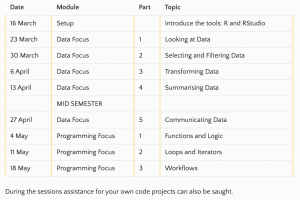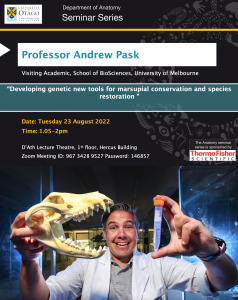Upcoming events hosted by or involving Genetics Otago will be listed here. Please check back regularly for updates. A calendar of events that may be of interest to our members can be found at the bottom of this page and in the sidebar of other pages on this site, please note that this includes events hosted outside of Genetics Otago.
VISG Seminar Series
The Virtual Institute of Statistical Genetics (VISG) Hub is a key part of Genetics Otago, providing a platform for researchers to collaborate and exchange knowledge and expertise in statistical genetics. The VISG Hub hosts seminars, workshops, and other events to promote statistical genetics research and foster collaboration between researchers.
We’re excited to announce our monthly genetics research seminars, aimed at connecting researchers in the field. The seminars will commence in May 2023 and will be hosted by GO’s Virtual Institute of Statistical Genetics (VISG) Hub along with the Department of Mathematics and Statistics at the University of Otago. These seminars will be available in person or via Zoom, and all are welcome.
Date: 3rd Thursday of the month
Time: 11:00 am – 12:00 pm
Schedule
- May: Associate Professor Phil Wilcox, University of Otago
- June: Professor Mik Black, University of Otago
- July: Dr Ludovic Dutoit, University of Otago – please note that this seminar will be held on the 27th of July rather than the 20th due to ICG.
- August: Dr Setegn Alemu, AgResearch
- September: Ee Cheng Oi, Abacus Bio
- October: Franziska Weik, Beef + Lamb NZ Genetics – Cancelled
- November: Dr Jane Symonds and Dr Megan Scholtens, Cawthron – please note that this seminar will be held on the 17th of November rather than the 16th due to the Genetics Otago Annual Symposium.
Zoom Details
If you would like the Zoom details for this event, please contact us.
Next Seminar
The next seminar will be held on Friday the 17th of November, 11 am in Biochemistry Seminar Room G13 and will be given by Dr Jane Symonds and Dr Megan Scholtens, Cawthron Institute.
Title: Environmental resilience in aquatic species
Abstract: The New Zealand aquaculture sector faces growing vulnerability due to climate change, with marine heatwaves already causing elevated summer mortality rates in Greenshell mussels and king (Chinook) salmon. To tackle these challenges, selective breeding and genomic selection offer long-term solutions. Temperature challenge models, implemented in controlled tank environments, have been developed for both species. So far, this approach has been applied successfully to test more than 230 pedigree king salmon families and 21 Greenshell mussel families. Heritabilities for time to death at elevated temperature were high (0.34 to 0.48) suggesting that selection for improved thermotolerance is possible.
Megan Scholtens
Megan is a geneticist within the Aquaculture Group at Cawthron and is involved in a number of research projects across the ‘Shellfish Aquaculture’ and ‘Finfish Climate Change Adaptation’ platforms. Megan specialises in the application of genetic and genomic methodologies to enhance the understanding of how genes affect traits such as growth, development, behaviour, reproduction and immunity to improve the efficiency, resilience and survivability of aquatic species. In addition, Megan contributes to research activities of the Aquaculture team by integrating the experimental biology with commercial production to help provide solutions for clients and deliver tangible outcomes for the aquaculture industry.
Jane Symonds
Jane is a Senior Scientist and Team Leader in the Aquaculture Group at Cawthron. Jane’s focus is the application of research to enhance sustainable commercial production with a specific interest in king salmon farming and selective breeding. She has over 30 years of experience in this field. As a science programme leader she oversees a wide range of multi-disciplinary collaborative projects with internal and external partners, including salmon feed efficiency, genomics, behaviour, health, physiology, microbiomics, climate change adaptation, data science and developing trials to selectively breed resilient and efficient king salmon. Implementation of research for sustainable and profitable aquaculture development is a key driver for Jane. Dr Symonds is also a Senior Adjunct Researcher at the University of Tasmania and helps supervise multiple post-graduate students.
If you have any questions about this seminar series please contact us.
Calendar of Events
The below is a calendar of events hosted by GO as well as events hosted by others that may be of interest to our members. If you have an event you would like us to include please contact us here.
R for Successful Student Projects is back again this semester starting 16th March. Across 9 sessions online, Wednesdays 10am-12pm, Murray Cadzow and Patricia Haden from the RTIS programming team will be teaching R, starting with an introduction to R syntax, through to using R with a focus on data, then onto how to use R programmatically. During each session, there will also be time to seek help and advice on how to use R for your own projects.
Staff are welcome to join in.
Please register your interest at https://rtis-training.github.io/r4ssp.
R for Successful Student Projects is back again this semester starting 16th March. Across 9 sessions online, Wednesdays 10am-12pm, Murray Cadzow and Patricia Haden from the RTIS programming team will be teaching R, starting with an introduction to R syntax, through to using R with a focus on data, then onto how to use R programmatically. During each session, there will also be time to seek help and advice on how to use R for your own projects.
Staff are welcome to join in.
Please register your interest at https://rtis-training.github.io/r4ssp.
R for Successful Student Projects is back again this semester starting 16th March. Across 9 sessions online, Wednesdays 10am-12pm, Murray Cadzow and Patricia Haden from the RTIS programming team will be teaching R, starting with an introduction to R syntax, through to using R with a focus on data, then onto how to use R programmatically. During each session, there will also be time to seek help and advice on how to use R for your own projects.
Staff are welcome to join in.
Please register your interest at https://rtis-training.github.io/r4ssp.
HRI is hosting an online student open day on Tuesday, 17th May 2022 from 12:00pm to 1:15pm (AEST).
This will give potential students and future RA’s the chance to learn more about what we do at HRI and get a feel for whether they would like to pursue study under our world-class researchers.
I would particularly encourage any students who are nearing completing of undergraduate degrees and interested in pursuing honours to attend, as our scientists are always interested in supervising up and coming researchers. I would also encourage those who have completed their honours or masters, as we have the RA Pathways to PhD program which may be of interest to them.
Interested parties can find out more information and register for the open day here: HRI Open Day • Heart Research Institute
R for Successful Student Projects is back again this semester starting 16th March. Across 9 sessions online, Wednesdays 10am-12pm, Murray Cadzow and Patricia Haden from the RTIS programming team will be teaching R, starting with an introduction to R syntax, through to using R with a focus on data, then onto how to use R programmatically. During each session, there will also be time to seek help and advice on how to use R for your own projects.
Staff are welcome to join in.
Please register your interest at https://rtis-training.github.io/r4ssp.
R for Successful Student Projects is back again this semester starting 16th March. Across 9 sessions online, Wednesdays 10am-12pm, Murray Cadzow and Patricia Haden from the RTIS programming team will be teaching R, starting with an introduction to R syntax, through to using R with a focus on data, then onto how to use R programmatically. During each session, there will also be time to seek help and advice on how to use R for your own projects.
Staff are welcome to join in.
Please register your interest at https://rtis-training.github.io/r4ssp.
R for Successful Student Projects is back again this semester starting 16th March. Across 9 sessions online, Wednesdays 10am-12pm, Murray Cadzow and Patricia Haden from the RTIS programming team will be teaching R, starting with an introduction to R syntax, through to using R with a focus on data, then onto how to use R programmatically. During each session, there will also be time to seek help and advice on how to use R for your own projects.
Staff are welcome to join in.
Please register your interest at https://rtis-training.github.io/r4ssp.
Professor Andrew Pask (School of BioSciences, University of Melbourne) is visiting Dunedin next week and will be giving a special seminar on Tuesday 23rd August at 1 pm in the D’Ath Lecture Theatre.
Prof. Pask has worked on marsupial development and genetics for over 20 years. He heads up the Thylacine integrated genomic restoration research lab (TIGRR) and the evo-devo-repro lab in the School of BioSciences. His research is exploring novel ways to conserve marsupials and de-extinct the thylacine.



